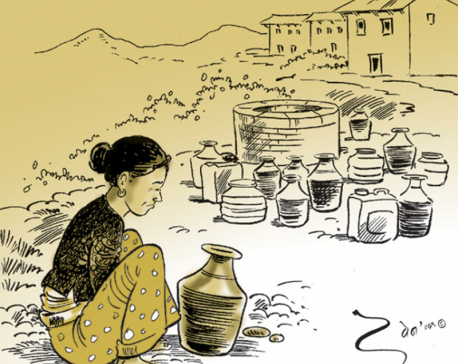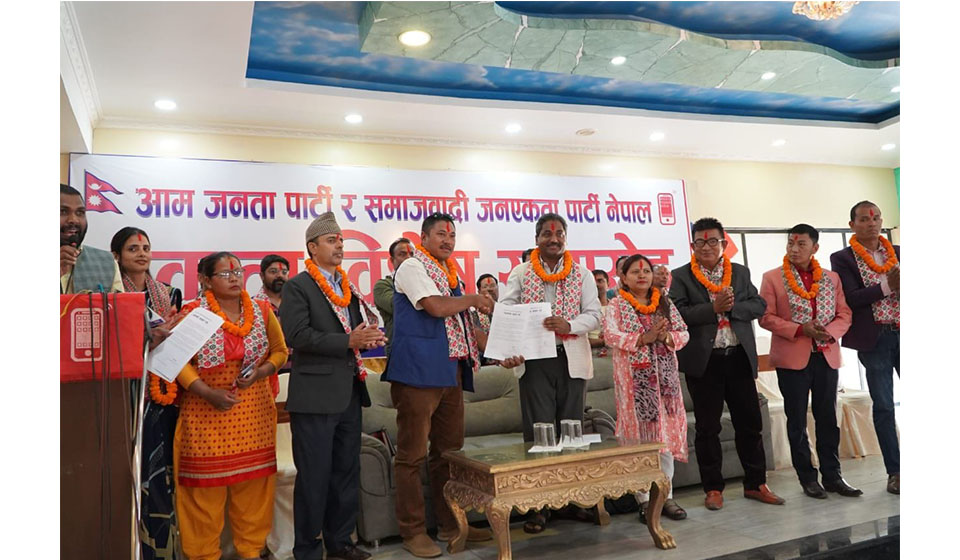
OR

KATHMANDU, Feb 17: A 19-year-old girl from the so called ‘high caste family’ from Baglung Galkot fell in love with Prakash BK, a Dalit youth from a neighboring village. The story took place 15 years ago. Within a year, their love affair deepened. Protests started from the girl's family when they came to know about their inter-caste love affair.
However, this didn’t affect the couple, instead their love grew stronger. They were ready to leave the family but not ready to break their relationship. The girl eloped with her beloved in 2065 BS and came to Kathmandu. The couple started living in Sankhamul with the help of their relatives.
After coming to Kathmandu, the girl informed her parents that she had married a Dalit youth. She was under pressure from her family to return home as soon as possible but the girl decided not to leave her husband. Her family started mentally torturing her over the phone.
One day, the mother said to her daughter on the phone, "I would rather have been glad to see you dead than call you my daughter."
She was deeply hurt by her mother's expression. The girl committed suicide the next morning. The couple, who vowed to be with each other through thick and thin, could not fulfill their promise because of the caste barrier.
In another incident, Hari Chandra Mahato of Phettagaon Rural Municipality-1 of Bara killed his own daughter about six months ago after finding out that she was in love with a Dalit youth. After a long investigation, the police arrested Mahato on January 23.
Mahato admitted to the police that he killed his daughter as she was in a relationship with a Dalit youth. According to the police, Mahato had stopped his daughter from meeting the Dalit youth. Her parents killed her after they found out that she was secretly meeting him.
Similarly, seven years ago, 18-year-old Ajit Mizar of Panchkhal Municipality-7 in Kaverapalanchowk was killed due to an inter-caste marriage. A high-caste Brahmin girl with the surname Parajuli, who studied together with Mizar, eloped with him as the two were deeply in love. The family of Mizar insists that he was killed within four days.
Even within the Dalit community, sexual minorities face exploitation due to inter-caste relationships. Shanta Pariyar (name changed), from Panchthar, fell in love with a Kshatriya girl from a neighboring district three years ago. This couple, both belonging to the sexual minority group, fell in love through TikTok.
One day, Pariyar’s partner expressed, "My family will not accept our marriage." Initially, Pariyar thought this was because of their sexual minority status. However, when her girlfriend reiterated the concern, Pariyar thought it was due to financial instability, and assured, "I'll get a job. We won't lack money."
Despite these reassurances, her girlfriend repeated her apprehensions. Pariyar even offered to undergo gender transition surgery for her partner's sake. Yet, it was revealed that the true barrier was caste discrimination. This revelation led Pariyar to end the relationship.
"We fell in love within three or four months. I broke up when caste became an issue. Continuing the relationship after caste issues emerged seemed pointless. Yet, the pain of separation from someone I loved was unbearable. It was hard to forget, but I managed to move on," Pariyar told Republica.
A study has shown that 40 people from the Dalit community have been murdered in 12 years following the enactment of Nepal's Caste-Based Discrimination and Untouchability Act. The "Achievement of Dalit Movement in Nepal" report, unveiled in Kathmandu on Thursday, highlights this grim statistic. Authored by Heera Bishwakarma, Neetu Pokharel, and Som Niraula, the report reveals the ongoing struggle for Dalit rights in Nepal.
Devaraj Bishwakarma, chairman of the National Dalit Commission, said that apart from the complaints filed with the commission, there are hundreds of such incidents across the country. "Not all incidents get reported," he said.
According to the study, some of the reasons for the murders are related to inter-caste love and marriage, mentioned Bishwakarma, the coordinator of the study team. "In some cases, people are sent to jail in the pretext of child marriage or rape,” said Bishwakarma. According to Bishwakarma, even if the couples are of marriageable age, it has been found that they are tortured under various pretexts.
Bishwakarma said that even though it has been more than half a century since the struggle against caste-based discrimination started in Nepal, there hasn’t been much improvement on this front. Even to this day, caste is still a form of obstacle in love, especially for the Dalits.
Bishwakarma said that the government has not yet implemented an effective program to end this social discrimination. According to Bishwakarma, two types of policies should be implemented to end any discrimination - one being proper punishment and the other an incentive program.
Bishwakarma said that social discrimination could not be reduced even in so many years because the government did not give proper attention to both the programs. "Neither the laws were implemented effectively, nor did the government continue the incentive program for inter-caste love marriages," said Bishwakarma.
According to sociologist Suresh Dhakal, inter-caste love remains a longstanding issue in Nepali society. He argues that despite people having the freedom to choose whom they love, societal norms and pressures still play a significant role in hindering inter-caste relationships.
"There is still no personal freedom. Society imposes its values on individuals," he stated. Dhakal mentioned that a major barrier to accepting inter-caste love is the societal authority over the acceptance or rejection of such relationships, despite it being a personal choice.
Dhakal also said that even after eight decades of the Dalit movement, the anticipated progress in eradicating caste-based discrimination has not yet materialized. He suggests that this stagnation is partly because people who are seen as agents of change behave differently within their own communities, thereby perpetuating caste-based discrimination.
"For instance, when six young men were killed in Rukum over inter-caste love, the so-called revolutionaries of our society remained silent," he said.
Furthermore, Dhakal noted that despite the long history of the Dalit movement, discrimination against the community still persists. He emphasized that the power imbalance between the rich and the poor in Nepali society also needs to be addressed to eliminate caste-based discrimination. Dhakal suggests it is time to critically evaluate the Dalit movement, as discrimination continues despite the lengthy campaign.
He also criticized the Dalit movement for not being clear about its issues, being too aligned with political parties, and not focusing enough on reforms, which has allowed divisions to persist.
You May Like This

Dalit man suffering discrimination from his ilk
JUMLA, Dec 27: An incident of practice of 'untouchability' within the dalit community itself has come to light at Haku... Read More...

Rising Intolerance against Dalits in Nepal
I remember those days of three decades ago, when one of my Brahmin friends of western Nepal married a Dalit... Read More...

Dalit woman elected unopposed in Siswa Manara Municipality
MAHOTTARI, Sept 13: Sanjogiya Devi, who has registered her candidacy for the Dalit member of Siswa Manara Municipality-8 from Nepali Congress... Read More...




Just In
- Sunkoshi-Marin Diversion Project’s tunnel construction nears completion, breakthrough scheduled for May 8
- Govt tightens security arrangement for Third Investment Summit 2024
- Pesticide residue found in vegetables in Nepalgunj
- Aam Janata Party and Samajwadi Jana Ekata Party merge
- 1,600 participants confirmed for Nepal Investment Summit
- Ilam-2 by-elections held peacefully, vote count likely to start tonight
- NEA schedules five-day power cut across Kathmandu Valley for underground cable installation
- Hundreds of passengers including foreign tourists in distress as poor visibility halts flights to and from PRIA







-1200x560-wm_20240427144118.jpg)





Leave A Comment